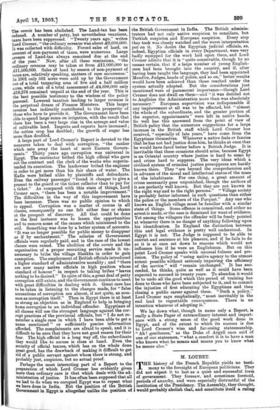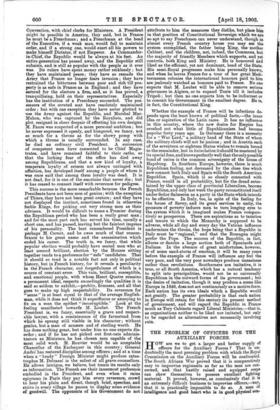M. LOITBET. T HE history of the French Republic yields no
testi- mony to the foresight of European politicians. They did not expect it to last as a quiet and successful form of government. They foresaw, and sometimes foretold, periods of anarchy, and were especially distrustful of the institution of the Presidency. The Assembly, they thought, would probably abolish that, and constitute itself a ruling Convention, with chief clerks for Ministers. A President might be possible in America, they said, but in France he must be a Frenchman ; and a Frenchman at the head of the Executive, if a weak man, would fail to maintain order, and if a strong one, would exert all his powers to make himself Dictator, if not Emperor. As Commander- in-Chief, the Republic would be always at his feet. An entire generation has passed away, and the Republic still subsists, and is still as popular with the people as it ever was. Its rulers have spent money rather recklessly ; but they have maintained peace ; they have so remade the Army that France no longer fears invasion ; they have restrained the bitterness between poor and rich till pro- perty is as safe in France as in England ; and they have seeured for the electors a firm, and, as it has proved, a tranquillising, hold on their representatives. Especially has the institution of a Presidency succeeded. The pos- sessors of the coveted seat have resolutely maintained order ; but with one exception they have never plotted to use the Army against the Republic, and Marshal Mac- Mahon, who was captured by the Royalists, and did plot, resigned in sheer despair of effecting his own designs. M. Faure was suspected of a more personal ambition ; but he never expressed it openly, and hungered, we fancy, not so much for a throne as for the showy pomp with which a throne is usually surrounded. In any case, he died an ordinary civil President. A succession of competent men have consented to be Chief Magis- trates, and have remained faithful to their oaths, so that the lurking fear of the office has died away among Republicans, and that a new kind of loyalty, a temperate loyalty of esteem not always untinged with affection, has developed itself among a people of whom it was once said that among them loyalty was dead. It is not dead, for it is one of the emotions that never die ; but it has ceased to connect itself with reverence for pedigree.
This success is the more remarkable because the French Presidents have not been men of genius ; with the exception of Thiess, they have not been great orators ; and they have not displayed the instinct, sometimes found in otherwise feeble Kings, for picking out very strong men as their advisers. It would be difficult to name a Premier during the Republican period who has been a really great man ; and for the most part each has served his time, usually a short one, and has passed, leaving but the faintest impress of his personality. The best remembered President is perhaps M. Carnot, and he owes much of that remem- brance to his great name and the assassination which ended his career. The truth is, we fancy, that while popular election would probably have seated men who at least seemed brilliant, election by the Houses sitting together tends to a preference for" safe "candidates. That it should so tend is a notable fact not only in political history, but in French history, for it reveals a peculiarity in the French character, our forgetfulness of which is a source of constant error. This vain, brilliant, susceptible, and, emotional people, with whom Henri Quatre remains a permanent ideal, respects exceedingly the qualities it is said so seldom to exhibit,—probity, firmness, and all that goes to make up high respectability. Its reverence for " sense" is at least equal to that of the average English- man, while it does not think it superfluous or annoying to fix on a man the epithet "incorruptible." Look at the feeling manifested towards M. Loubet. The French President is, we fancy, essentially a grave and respect- able lawyer, with a reminiscence of the farmstead from which he sprang still visible in his character ; without genius, but a man of acumen and of sterling worth. He has done nothing great, but under him no one expects dis- order; and if he has not picked out first-rate adminis- trators as Ministers, he has chosen men capable of the most solid work. M. Rouvier would be an acceptable Chancellor of the Exchequer in this country ; General Andre has restored discipline among officers ; and at a time when a " heady " Foreign Minister might produce catas- trophes M. Delcasse is the safest of all grave counsellors. He allows intrigue, we believe, but treats its results only as information. The French see their innermost preference embodied in the President, and even when it rains epigrams in Paris they pay him every reverence, crowd to hear his plain and direct, though brief, speeches, and strive in every village he passes to display some evidence of goodwill. The opponents of his Government do not attribute to him the measures they dislike, but place him in that position of Constitutional Sovereign which we are so apt to say Frenchmen can never understand, though in almost every French country house you may see the system exemplified, the father being King, the mother Cabinet, and the children, not, indeed, the Commons, but the majority of friendly Members which supports, and yet controls, both King and Ministry. He is honoured and liked as the efficient, yet not dominant, head of the State. His semi-Royal progresses make him personally known, and when he leaves France for a tour of her great Medi- terranean colonies the international honours paid to him are jealously watched as honours paid to France. No one expects that M. Loubet will be able to remove serious grievances in Algiers, or to expand Tunis till it includes Tripoli ; but then no one expects him to be indiscreet or to commit his Government in the smallest degree. He is, in fact, the Constitutional King.
Whether the example of France will be infectious de- pends upon the least known of political facts,—the inner idea or aspiration of the Latin races. It has no influence in this country, where the new desire for Empire has crushed out what little of Republicanism had become popular forty years ago. In Germany there is a necessity for a "War Lord," a military head of the State of whom the military chiefs will not be jealous ; and in Austria each of the seventeen or eighteen States wishes to remain bound to the remainder, lest in its isolation it should be mastered by its special foes, and knows perfectly well that the only possible bond of union is the common sovereignty of the house of Hapsburg. In Southern Europe, however, there is much Republican feeling, not decreased by the close ties which now connect both Italy and Spain with the South American Republics. Spain, which is so closely connected with France, would in all probability, but for the dread enter- tained by the upper class of provincial Liberalism, become Republican, and only last week the party reconstituted itself under Sefior Salmeron as a party in the State which intends to be effective. In Italy, too, in spite of the feeling for the house of Savoy, and its great services to unity, the pressure of poverty induces men to turn longing eyes to the system which it is imagined makes France compara- tively so prosperous. There are aspirations as to taxation and tenure to which the Monarchy is supposed to be adverse, while all day and every day the Vatican influence undermines the throne, the hope being that a Republic in Italy must be "regional," and that the Romagna might prefer the Pope. The success of the Republic, in fact, allures or dazzles a large section both of Spaniards and Italians. In the absence of great misfortunes, however, or of some sand-storm of emotion, it will be many years before the example of France will influence any but the very poor, and the very poor nowadays produce uneasiness rather than revolutions. Southerners are imitative, it is true, or all South America, which has a natural tendency to split into principalities, would not be so universally Republican in the outward forms of its government ; but the desire of imitation, though it may produce a scene like Europe in 1848, does not act continuously as a motive force. Each nation has its own ideals which a Republic would not gratify. The greater probability is that each nation in Europe will retain for this century its present method of government, and will regard the Republic in France much as Tory Cabinets regard Liberal Ministries,—that is, as organisations neither to be liked nor imitated, but only to be regarded as alternatives not necessarily involving ruin.







































 Previous page
Previous page